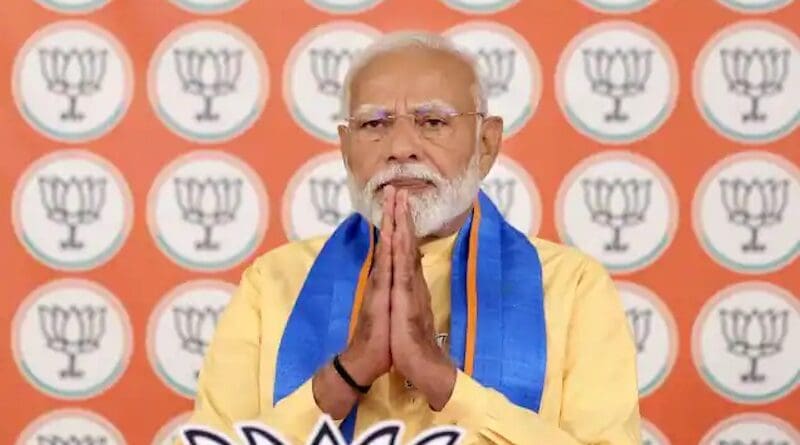India’s Diplomatic Doublespeak: Modi’s Hollow Commitment To The ‘Two-State Solution’ – OpEd

India's Prime Minister Narendra Modi. Photo Credit: narendramodi.in
In the corridors of the United Nations last week, Indian Prime Minister Narendra Modi reaffirmed India’s enduring support for a ‘two-state solution’ in the Israel-Palestine conflict.”. Modi’s words, delivered during a meeting with Palestinian President Mahmoud Abbas, may seem like a diplomatic commitment to peace, but a closer inspection reveals a cynical contradiction between India’s rhetoric and its actions. The doublespeak in Modi’s diplomacy has never been clearer.
India’s position on the Israel-Palestine issue has traditionally been one of careful equilibrium. As a nation that was once a staunch supporter of Palestinian self-determination, India’s diplomatic positioning has undergone a seismic shift under the Modi government. Today, India claims to champion the cause of peace and Palestinian sovereignty while simultaneously deepening its ties with Israel, including providing military assistance to a regime that has been repeatedly accused of committing war crimes against Palestinians.
A Two-State Solution or Hollow Lip Service?
During his meeting with Abbas, Modi reiterated his support for a two-state solution, a formula that envisions an independent Palestinian state coexisting with Israel. On paper, it aligns with the aspirations of the Palestinian leadership and the international community. However, Modi’s declarations ring hollow against the backdrop of India’s recent abstentions at the United Nations.
Just days before Modi’s meeting with Abbas, India abstained from a crucial UN General Assembly vote demanding that Israel end its ‘unlawful presence’ in the Occupied Palestinian Territories (OPT) within 12 months. The resolution, which passed with 124 votes in favor, 14 against, and 43 abstentions, was based on a ruling by the International Court of Justice (ICJ) that found Israel’s ongoing presence in the OPT to be a violation of international law. Modi’s government, by refusing to support this resolution, not only undermined its professed commitment to Palestinian statehood but also tacitly condoned Israel’s illegal settlements, which are at the heart of the conflict.
Modi’s carefully crafted statements of support for a two-state solution are more performative than substantive. It’s a classic example of diplomatic doublespeak—a rhetorical dance that creates the illusion of moral high ground while doing little to challenge the status quo of occupation and violence. Modi’s words, framed in the language of peace and dialogue, obscure India’s growing military and strategic cooperation with Israel.
The Arms Deal Hypocrisy
Perhaps the most glaring contradiction in Modi’s diplomatic posture is India’s arms trade with Israel. Since Modi took office in 2014, defense ties between the two countries have strengthened dramatically. India is now one of the largest importers of Israeli arms, and the two nations regularly conduct joint military exercises. This deepening military relationship is particularly troubling given Israel’s widely documented use of force against Palestinians in Gaza and the West Bank.
Israel’s recent military offensive in Gaza, which began in October last year, has left more than 40,000 people dead, including 16,500 children. These numbers represent a grim reality that the world cannot ignore, yet India’s response has been conspicuously muted. Modi’s government has consistently avoided condemning Israel’s actions, even as the death toll in Gaza continues to climb.
The irony here is palpable. While Modi was meeting with Abbas and reiterating India’s commitment to the Palestinian cause, his government was likely finalizing deals for Israeli drones and missile systems—tools that could potentially be used in the very conflict India claims to want to resolve through peaceful means. Critics have pointed out the absurdity of Modi’s volte-face: how can India advocate for a two-state solution while enabling the military capacity of the very regime that is systematically undermining it?
Abstaining from Accountability
India’s abstention at the UN vote is not an isolated incident. It is part of a broader trend of fence-sitting that has characterized Modi’s foreign policy on sensitive international issues. In recent years, India has abstained from numerous UN resolutions critical of Israeli actions, signalling a reluctance to alienate a valuable strategic partner. While the Modi government couches these abstentions in the language of neutrality, they are, in reality, acts of complicity.
New Delhi’s refusal to take a clear stance on the Palestine issue is rooted in its desire to maintain strong ties with both Israel and the Arab world. However, under Modi, the balance has tipped decisively in favor of Israel. This shift is not just a matter of realpolitik; it reflects a broader ideological alignment. Modi’s Bharatiya Janata Party (BJP) has long viewed Israel as a model for how a nation can aggressively assert its identity in the face of external threats, real or perceived. The BJP’s Hindu nationalist base sees parallels between Israel’s policies towards Palestinians and India’s own approach to its Muslim minority, particularly in Kashmir.
The abstentions at the UN and the arms deals with Israel are emblematic of a foreign policy that prioritizes economic and strategic interests over human rights and international law. By continuing to abstain from holding Israel accountable for its actions, Modi’s government is sending a clear message: India’s support for Palestinian sovereignty is conditional, and its commitment to a just resolution of the conflict is largely rhetorical.
The Global Implications of India’s Doublespeak
Modi’s diplomatic doublespeak is not without consequences. As India seeks to position itself as a global leader, particularly in multilateral forums like the UN, its credibility is being called into question. Countries in the Global South, which have traditionally looked to India as a champion of anti-colonial struggles and a voice for the oppressed, are increasingly sceptical of its shifting allegiances.
India’s failure to take a firm stand on the Palestine issue undermines its claim to moral leadership in global affairs. It also risks alienating the Arab world, which has been a critical partner in India’s energy security and economic growth. While Modi’s government has worked hard to maintain strong ties with Gulf states, its growing closeness to Israel could strain these relationships, particularly as the situation in Gaza deteriorates.
Moving Forward
Prime Minister Modi’s reiteration of support for the two-state solution is a classic case of diplomatic doublespeak—an empty gesture meant to placate international opinion while avoiding any meaningful action. As India deepens its military and economic ties with Israel, its claims to support Palestinian self-determination become increasingly hollow. In abstaining from key votes at the UN, Modi’s government is not merely sitting on the fence; it is actively enabling a regime that continues to perpetuate violence and occupation.
India’s global aspirations will ultimately be shaped by its actions, not its rhetoric. If Modi wants to position India as a responsible global power, he must reconcile the contradictions in his foreign policy and take a principled stand on the Israel-Palestine conflict. Until then, India’s doublespeak will continue to erode its credibility on the world stage.

Debashis Chakrabarti
Debashis Chakrabarti is an international media scholar and social scientist, currently serving as the Editor-in-Chief of the International Journal of Politics and Media. With extensive experience spanning 35 years, he has held key academic positions, including Professor and Dean at Assam University, Silchar. Prior to academia, Chakrabarti excelled as a journalist with The Indian Express. He has conducted impactful research and teaching in renowned universities across the UK, Middle East, and Africa, demonstrating a commitment to advancing media scholarship and fostering global dialogue.
No comments:
Post a Comment